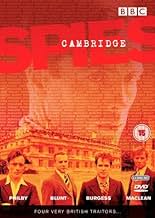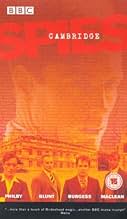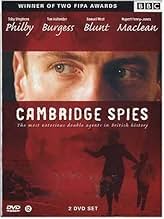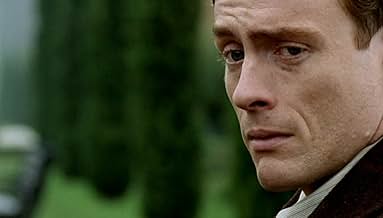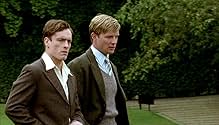AVALIAÇÃO DA IMDb
7,4/10
2,4 mil
SUA AVALIAÇÃO
A verdadeira história de um grupo de estudantes da Universidade de Cambridge.A verdadeira história de um grupo de estudantes da Universidade de Cambridge.A verdadeira história de um grupo de estudantes da Universidade de Cambridge.
- Indicado para 4 prêmios BAFTA
- 3 vitórias e 5 indicações no total
Explorar episódios
Avaliações em destaque
Well made and acted but I'm afraid it didn't have the guts to show the reality of the result of their treason. Why did we not see the suffering and death of the agents whom the Cambridge spies betrayed? Why did they never confront the hypocrisy of helping a regime which sides with Hitler, imprisons its' population and regularly executes their KGB contact agents? It tries to be sympathetic to men who put their loyalty to their friends above their loyalty to their country, their colleagues and those they're supposed to be protecting. What's more even that is incredibly flawed, Blunt abandons the rest of the group to their fate, Philby sleeps with McClean's wife and sends Burgess to accompany him into exile behind the Iron Curtain unaware that he's never coming back to the UK (and will quickly drink himself to death in Moscow).
What's more it only seems to tell half the story, concentrating disproportionately on the recruitment process and the influence of the Spanish civil war on the group. We get none of the fallout from the defection which was a revelation in Britain at the time or Philby's infamous press conference which is still cited today as a classic example of how to lie, we never get Philby's flight from Beruit or McClean and Caincross' plea bargain. Perhaps the most sympathetic character in the whole story is James Jesus Angleton who appears to be the lone voice in the wilderness.
So all told a great series but do some research first.
What's more it only seems to tell half the story, concentrating disproportionately on the recruitment process and the influence of the Spanish civil war on the group. We get none of the fallout from the defection which was a revelation in Britain at the time or Philby's infamous press conference which is still cited today as a classic example of how to lie, we never get Philby's flight from Beruit or McClean and Caincross' plea bargain. Perhaps the most sympathetic character in the whole story is James Jesus Angleton who appears to be the lone voice in the wilderness.
So all told a great series but do some research first.
This is a lightly fictionalised account of how four tewwibly well brought up English boys betrayed their country to the Soviet Union. Philby's father had been a distinguished diplomat and Arabist and McLean's a cabinet minister. All had public school educations and had been undergraduates at the same Cambridge college. They set off into promising careers in the foreign office and security services and were Soviet agents from the start. Their great coup was to give the Soviets enough details about the atomic bomb to speed up their program to build one by a couple of years, but it was at the expense of blowing McLean and Burgess's cover (they escaped to Moscow in 1951), and Philby being fired from MI6. He joined them in Moscow in 1963. Blunt, by now the Keeper of the Queen's Pictures was then interrogated; he confessed, and was let go.
It's one of the really great spy stories of the 20th century. This version concentrates on the personal dynamics. The amount of contact the spies had with each other after Cambridge seems to be much exaggerated (pretty bad security), but gives us the picture of the gang of four against the Establishment. The women are interesting too. Philby was a ladies' man to whom Donald McLean's American wife Melinda (Anne-Louise Plowman) was attracted. They later lived together in Moscow. Blunt and Burgess were both gay, but friends rather than lovers.
The Establishment, in the person of Lord Halifax (James Fox), Ambassador to Washington, found it difficult to believe that 'people like us' could do such things and started looking for the atomic spy in the embassy kitchens. One or two western counter-intelligence operatives including the CIA's formidable James Jesus Angleton nearly nabbed them, but with Philby tipping them off (and duchessing Angleton), Burgess and McLean made it safely to Moscow.
With four hours to play with all the characters are richly drawn. Tom Hollander's Guy Burgess is a drunken dirty little sod who somehow manages to be witty and charming as well. It was great cover for a spy. As Donald McLean, Rupert Penry-Jones is the Golden Boy who feels himself unworthy, and sees communism as the way to redemption. Toby Stephens as Kim Philby gives us the cleverness, the deviousness and the angst as well, especially in the Spanish episode.(I'm afraid us Philbys are a devious lot, but we bleed, we bleed). Samuel West's Blunt has the occasional hint of emotion, but basically is a cold fish. Art, it seems is his life. He does get on tewwibly well with the Queen.
Seventy years on, it's not so much why they did it, but why they kept it up that mystifies. Given their location close to the heart of British Intelligence and hence knowing as much as anybody outside about what really went on the Soviet Union, it's extraordinary that Philby and McLean in particular continued on right up to 1951 (Blunt was more or less inactive after 1945). It is suggested here that Ms McLean did try to get her husband to give up spying but there's no real explanation as to why he persisted. Perhaps he still believed. Anyway, truth or fiction is hardly the point here - Sunday night is not for history lessons. This is a familiar tale well told, visually splendid and not too taxing. The real story, I suspect, is far too complex for even the most adroit (or left) TV producer. An earlier TV account,"Philby Burgess and McLean" (1977) is also worth watching, if you can find it.
It's one of the really great spy stories of the 20th century. This version concentrates on the personal dynamics. The amount of contact the spies had with each other after Cambridge seems to be much exaggerated (pretty bad security), but gives us the picture of the gang of four against the Establishment. The women are interesting too. Philby was a ladies' man to whom Donald McLean's American wife Melinda (Anne-Louise Plowman) was attracted. They later lived together in Moscow. Blunt and Burgess were both gay, but friends rather than lovers.
The Establishment, in the person of Lord Halifax (James Fox), Ambassador to Washington, found it difficult to believe that 'people like us' could do such things and started looking for the atomic spy in the embassy kitchens. One or two western counter-intelligence operatives including the CIA's formidable James Jesus Angleton nearly nabbed them, but with Philby tipping them off (and duchessing Angleton), Burgess and McLean made it safely to Moscow.
With four hours to play with all the characters are richly drawn. Tom Hollander's Guy Burgess is a drunken dirty little sod who somehow manages to be witty and charming as well. It was great cover for a spy. As Donald McLean, Rupert Penry-Jones is the Golden Boy who feels himself unworthy, and sees communism as the way to redemption. Toby Stephens as Kim Philby gives us the cleverness, the deviousness and the angst as well, especially in the Spanish episode.(I'm afraid us Philbys are a devious lot, but we bleed, we bleed). Samuel West's Blunt has the occasional hint of emotion, but basically is a cold fish. Art, it seems is his life. He does get on tewwibly well with the Queen.
Seventy years on, it's not so much why they did it, but why they kept it up that mystifies. Given their location close to the heart of British Intelligence and hence knowing as much as anybody outside about what really went on the Soviet Union, it's extraordinary that Philby and McLean in particular continued on right up to 1951 (Blunt was more or less inactive after 1945). It is suggested here that Ms McLean did try to get her husband to give up spying but there's no real explanation as to why he persisted. Perhaps he still believed. Anyway, truth or fiction is hardly the point here - Sunday night is not for history lessons. This is a familiar tale well told, visually splendid and not too taxing. The real story, I suspect, is far too complex for even the most adroit (or left) TV producer. An earlier TV account,"Philby Burgess and McLean" (1977) is also worth watching, if you can find it.
A very highly fictionalised account - but why did it need to be? The story of the Cambridge Five really did deserve better than this.
As drama it can't be faulted, but as a depiction of historical events it left much to be desired. We British are prone to look down upon the American TV movie, and for all the same reasons that were evident in the Cambridge Spies.
The story of the Five is well known enough for me not to have to point out the inaccuracies involved in this production, but beyond that I had no real sense of time and place, and certainly no sense of the evil these men did and the horrors and tragedies that came about as a result of their activities. In four hours there was room enough to get it right.
Some events were tick-boxed in glib exchanges, others rendered risible - the horror of Guernica reduced to one aged aeroplane with German markings, a mother, her son, the rattle of gunfire, the inevitable priest who rushes to the aid of the dead boy.
Philby lost his stammer, MacLean's bisexuality was never hinted at, Burgess became almost a paragon of virtue compared with the reality of the man, and Blunt...
The appeal of this series was, whatever the BBC might say, that it was based around real events. In that case I feel the viewer has a right to expect factual accuracy, otherwise the fictionalisation may as well have extended to the substitution of fictional names for the characters, and the excising of the "what happened next" text before the end-credits.
As BBC drama this was well up to standard, as BBC factual drama it took a long step in the wrong direction.
As drama it can't be faulted, but as a depiction of historical events it left much to be desired. We British are prone to look down upon the American TV movie, and for all the same reasons that were evident in the Cambridge Spies.
The story of the Five is well known enough for me not to have to point out the inaccuracies involved in this production, but beyond that I had no real sense of time and place, and certainly no sense of the evil these men did and the horrors and tragedies that came about as a result of their activities. In four hours there was room enough to get it right.
Some events were tick-boxed in glib exchanges, others rendered risible - the horror of Guernica reduced to one aged aeroplane with German markings, a mother, her son, the rattle of gunfire, the inevitable priest who rushes to the aid of the dead boy.
Philby lost his stammer, MacLean's bisexuality was never hinted at, Burgess became almost a paragon of virtue compared with the reality of the man, and Blunt...
The appeal of this series was, whatever the BBC might say, that it was based around real events. In that case I feel the viewer has a right to expect factual accuracy, otherwise the fictionalisation may as well have extended to the substitution of fictional names for the characters, and the excising of the "what happened next" text before the end-credits.
As BBC drama this was well up to standard, as BBC factual drama it took a long step in the wrong direction.
What a superb series the BBC has made in Cambridge Spies! The cast are really fantastic. My favourite actor has to be Imelda Staunton as the late Queen Mother. She has some of the best lines and delivers them so well. The leads are cast very well indeed. Tom Hollander is suitably seedy as Guy Burgess, Samuel West is very starchy and upper class as Blunt, Rupert Penry-Jones is wonderful as the handsome but flawed Donald Maclean and Toby Stephens is delightfully dislikable as Kim Philby. These characters are thoroughly entertaining and horrible in the extreme in their betrayal of King and Country. The cloak and dagger feel of the piece is wonderful. The settings are really great too. Cambridge is so beautiful. The writers should be congratulated in keeping the pace moving so well. All in all BBC you have done it again. I wish we saw more quality drama like Cambridge Spies!
10mattsday
The BBC has once again shown that they can still create top quality drama. While there may be some historical issues with the script, one has to admire the fact that the characters are portrayed accurately and convincingly. Having just seen the last of the four-part series, I can comment that for entertainment value it is top notch.
Sure, some may argue the historical facts are inaccurate, or that the light spun upon the situation is somewhat different to how it was at the time, but much information about the infamous Cambridge spies is uncertain at best - in particular Kim Philby (Toby Stephens) is somewhat a mystery even today. Do not be fooled into thinking that this series is a documentary, it isn't. However, you will be forgiven for thinking that you are watching the actual events, with the locations, pieces and acting all first class.
Watch it with an open mind, as if it is fictional. You will be greatly rewarded, excited and even humoured at how four masterminds underplayed the archaic MI6 for their principals. I'd certainly recommend it.
Overall: 9/10 - Losing the ultimate 1 mark for seeming rushed in parts and sometimes making it hard to understand the relationships between the very complex characters - particularly at the start of the series.
Sure, some may argue the historical facts are inaccurate, or that the light spun upon the situation is somewhat different to how it was at the time, but much information about the infamous Cambridge spies is uncertain at best - in particular Kim Philby (Toby Stephens) is somewhat a mystery even today. Do not be fooled into thinking that this series is a documentary, it isn't. However, you will be forgiven for thinking that you are watching the actual events, with the locations, pieces and acting all first class.
Watch it with an open mind, as if it is fictional. You will be greatly rewarded, excited and even humoured at how four masterminds underplayed the archaic MI6 for their principals. I'd certainly recommend it.
Overall: 9/10 - Losing the ultimate 1 mark for seeming rushed in parts and sometimes making it hard to understand the relationships between the very complex characters - particularly at the start of the series.
Você sabia?
- CuriosidadesSamuel West, who portrays Anthony Blunt in this series, played the same role 16 years later in season 3, episode 1 of The Crown (2016).
- Erros de gravaçãoAnthony Blunt is referred to as a relative by the Prince of Wales (Edward VIII). Blunt was actually a second cousin of Elizabeth wife of George VI (later the Queen Mother) and not related to the Windsors at all.
- Citações
Guy Burgess: Vladivostok, Moscow, the Kusnetsk Basin, Cambridge - the coldest places on Earth. Of the four, Cambridge is the coldest, permanently February the nineteenth.
- ConexõesVersion of Philby, Burgess and Maclean (1977)
- Trilhas sonorasJerusalem
by Hubert Parry
Principais escolhas
Faça login para avaliar e ver a lista de recomendações personalizadas
Detalhes
- Data de lançamento
- País de origem
- Central de atendimento oficial
- Idioma
- Também conhecido como
- Cambridge Spies
- Locações de filme
- Empresas de produção
- Consulte mais créditos da empresa na IMDbPro
Contribua para esta página
Sugerir uma alteração ou adicionar conteúdo ausente

